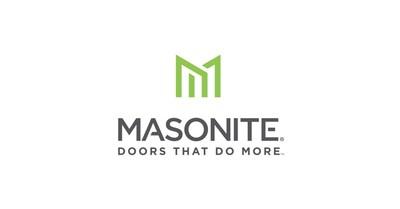Door manufacturer Masonite is showcasing the first residential smart door at CES 2022, highlighting the home building industry’s shift toward embracing connected technology. The concept was announced earlier in 2021, but CES is the first chance most will have to see the door in action.
A collaboration between Masonite, Ring, and Yale, the M-Pwr Smart Door is the first residential exterior door to integrate power, lights, sensors, a video doorbell, and a smart lock into the door system.
The door, a premium fiberglass model available in a variety of styles, colors, and finishes, needs to be professionally installed and connects to a home’s electrical system and Wi-Fi network. The integrated power solution does away with a big issue that homeowners deal with when trying to use this type of technology: recharging batteries.
The tech packed into this wooden frame includes a Ring Video doorbell (the company’s peephole camera), a Wi-Fi and Bluetooth Yale Assure smart lock, a Wi-Fi and Bluetooth powered PIR motion sensor, a door state sensor that uses the sensor array from the doorbell to determine if the door is open or closed, and motion-activated LED lighting embedded in the door’s threshold.
The door also has its own smart hub inside to facilitate connections and a built-in backup battery to keep everything running for up to 24 hours in the event of a power outage.
This video from Masonite shows the smart door in action.All the items — aside from the power cables — are upgradable, so you don’t need to replace your entire door when you want to upgrade to whatever whiz-bang feature Ring comes up with next.
“Components are homeowner replaceable,” confirms Cory Sorice, SVP and chief innovation officer of Masonite International. “The door will last decades, but the tech won’t — so it’s designed to make upgrades over time.” Sorice also said there are plans to partner with more companies for the components, offering more smart home ecosystem options. “In the future, if you want a Google Nest door, you can have it,” he says.
Currently, you do need three apps to use your door — Ring’s for the doorbell, Yale’s for the door lock, and Masonite’s own smartphone app for programming and controlling the motion-activated LED lighting and checking the door state.

This is the most disappointing aspect of the door from a user perspective and misses the mark on a fully integrated experience. The included Yale door lock doesn’t even work with Ring, even though Yale makes a Z-Wave lock that does.
But from a customer choice standpoint, it makes some sense, as you aren’t locked into a smart home ecosystem and can swap out components if you want.
The idea of adding power to a residential door is surprisingly a relatively new one, although common in the commercial space. Sorice, who’s the former head of innovation at Chamberlain Group, has a lot of experience with powered doors and smart home innovation.
He worked on Chamberlain’s MyQ smart garage door controller, including the integration with Amazon Key, a program that allows Amazon delivery drivers to access a customer’s garage or home using connected technology for a more secure delivery. “Through that process, I was able to see how much of a challenge it is to have a Wi-Fi-connected, battery-powered device,” Sorice says. When Masonite approached him to work on a connected door, he jumped at the chance to solve the problem of integrating smart tech into the front door.
Building a smart residential door turned out to be a bigger challenge than anticipated, particularly the power management and connectivity module that’s the basis for the concept. “Designing the cable system and cable management process, assembling all the components, that took a year and a half,” says Sorice.
Currently, Masonite M-Pwr Smart Doors are only available for new home construction, with the first models being deployed by Barringer Homes in the Plaza Midwood neighborhood of Charlotte, North Carolina. Sorice says additional builder partner announcements should be coming this year. For new home builds, pricing will be determined by the builder.
Tampa-based Masonite is focused on the builder channel first, but with 70 percent of the market in renovations, it is moving quickly towards offering configurations that will work in retrofit solutions.
“We should have some options in the renovation market in one to two years,” says Corey. This doesn’t mean you can pop down to your local Home Depot and pick one up, however. This product will be strictly pro-install, and you’ll also need an electrician on hand to wire everything. Pricing is also still unknown.
Ultimately, this type of product isn’t designed for the DIY smart home enthusiast. But it’s a pretty bold move toward the fully integrated smart home, built from the ground up to take advantage of sensors and connectivity to create safer, more secure, and ultimately smarter residential buildings. Paired with other innovations we’re seeing at CES that connect home systems together, such as Moen’s smart water network, this is an exciting direction for residential IoT.








